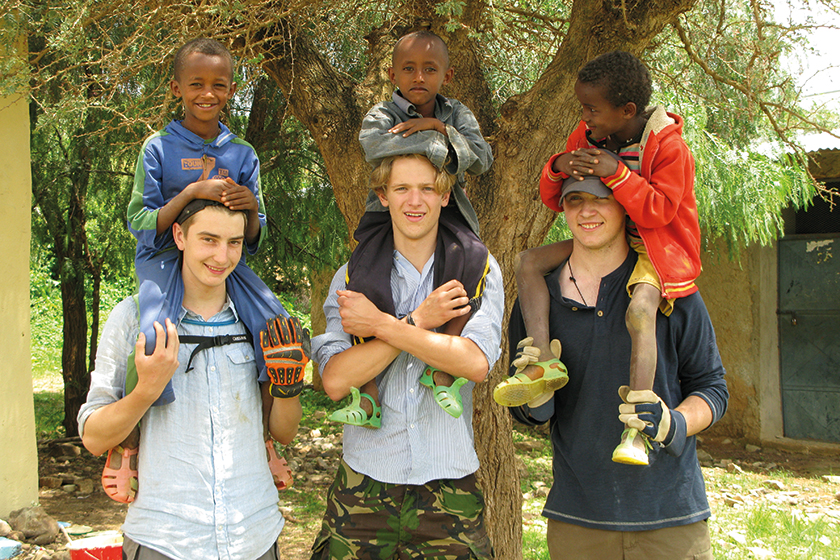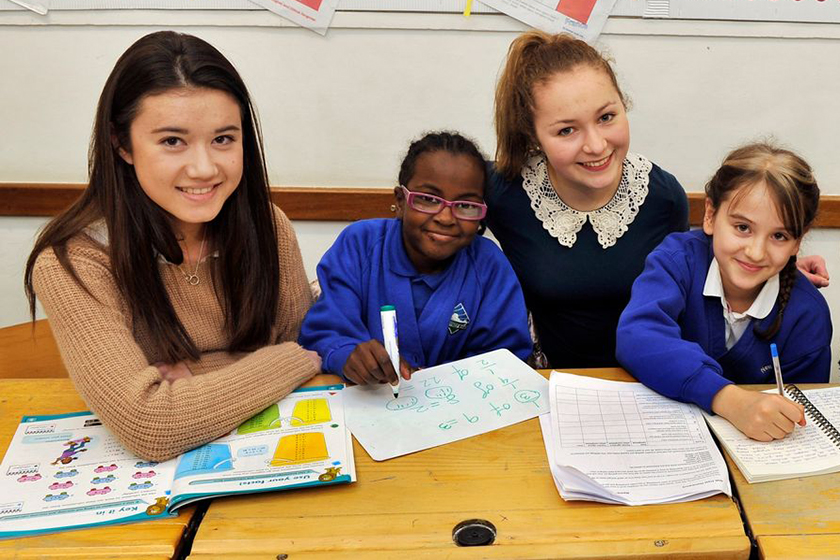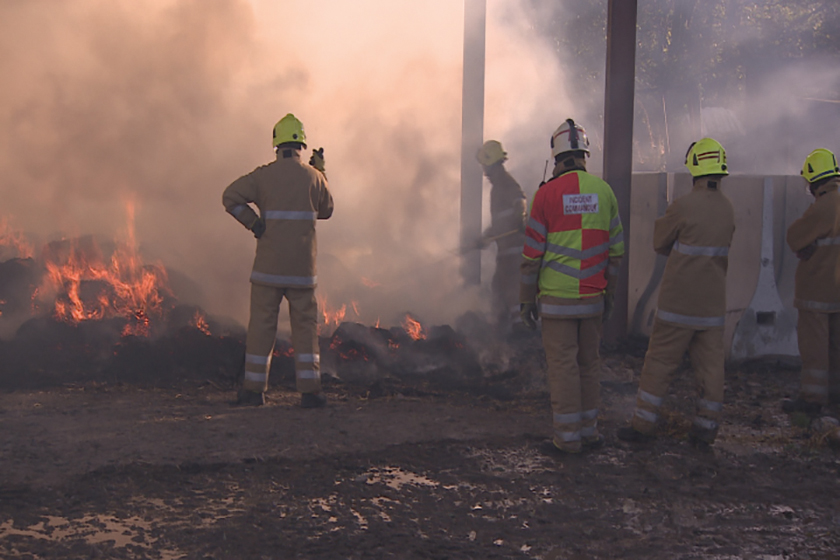How Schools are Giving Back to the Community
By
8 years ago
Preps and seniors across the UK live up to their charitable status through community-based projects

Emma Love considers the value of community service in schools and finds that the ethos of giving, when instilled in our children from an early age, reaps untold dividends all round.

Anyone with an ounce of sense understands that education is about far more than students achieving a clutch of grade-A results. The best schools have always favoured a holistic approach, putting emphasis on the importance of a fully-rounded, character-building timetable that extends far beyond the set academic curriculum. One crucial aspect of this is getting students involved in the community, whether that’s through charitable work, exchange programmes abroad or inviting others in need to use the school as a support.
Queen’s Gate School
Every Thursday, a group of elderly people from the local community come for a three-course lunch, eaten with and served by the pupils at Queen’s Gate School, a day school for girls in London. ‘We like working with Age UK,’ says Heloise Hutton, charity co-ordinator and deputy head of Year 8. ‘It teaches the girls a lot of good life skills, such as being able to talk and listen to others who aren’t in their age group and who have had totally different experiences to theirs.’ As well as the lunches, there’s also an annual tea dance at the school and a group of girls go carol singing at a local residential home before Christmas. ‘It is part of fulfilling our charitable status but what’s so lovely for me is to see how much the girls enjoy it.’
Worth School
As well as encouraging young people to ‘go on a journey of self-awareness and understanding’, the school states very clearly that a ‘positive approach to community living’ and service to others is fundamental. ‘Worth is a Benedictine school first and foremost and as well as offering a vibrant education, one of the values of the ethos is community,’ confirms Clement Donegan, a boarding housemaster. Each house has a charity and its own links with the local community; Donegan’s house works with St Francis of Assisi Catholic Primary School in Crawley. Every second Wednesday, he takes a group of sixth-form boys over to the school to assist in lessons and help the primary school pupils with subjects such as maths, art and music.
‘It’s fantastic for the kids but also my boys have learnt so much from them. I would hope that the experience offers those qualities that are integral to everyone: kindness, thoughtfulness and respect. It’s a very different setting to Worth and when they first went in they weren’t sure what to expect but they love going there.’ The link-up is so successful that it’s still growing: the choir from St Francis of Assisi has sung at Worth Abbey during a house assembly and, this summer, some of the pupils will visit Worth to take part in maths workshops and sports coaching.
Worth School’s Abbey is closely linked with an organisation called Outreach Peru. This summer, a group of pupils are going out to work in a children’s home in Ayacucho, helping out with cooking meals and playing games.
Reigate Grammar School
Reigate Grammar evolved from a free school to a grammar with independent status, selecting pupils by academic ability. It now has a well-established outreach sports programme and has paired up with Reigate Priory School to offer pupils access to its excellent sports facilities and, perhaps more importantly, their professional coaches. ‘Three years ago we started offering hockey to Reigate Priory Year Four pupils and now we have extended the programme to other sports, such as rugby and cricket. We work with more schools, run tournaments and offer masterclasses with our performance director of hockey, international player Chris Bowen and our performance director of rugby, Richard Birkett, who is an ex-WASP player,’ explains Rebecca Wickham, co-ordinator of the sports outreach programme and head of girls’ hockey.

The aim is to inspire young athletes by giving as many primary school students access to high-quality coaching and PE lessons. ‘You can see the children’s eyes light up when they catch sight of the astroturf hockey pitch; it’s much better for them than playing sports in the playground, which is what they would otherwise do,’ continues Wickham. ‘Our sports scholars help run the sessions and the tournaments, so it’s an opportunity for them to show their leadership skills and feel like they are giving something back to the community.’
Abbotsholme
Abbotsholme in Staffordshire has an exchange programme in place that includes children working on community projects in places such as India and Thailand. ‘At the moment I have a boy out in Cambodia helping to build a school but we also do projects in townships in South Africa and every other year we run a trip to Costa Rica where pupils stay in the rainforest and help plant trees in the secondary forest to try and encourage primary growth. It gives them an understanding of the devastation of the rainforests in Central America,’ says Joy Holmes who co-ordinates the projects as part of the school’s Round Square programme. Abbotsholme is one of only 11 schools in the country that are members of the worldwide Round Square association, whose core principles include service.
The Abbey School
‘Schools are part of the community and I think that they have an important role to play in it,’ says Rachel Dent, head of The Abbey school in Reading, a girls’ day school that has been running a homework club for children of refugee families in conjunction with the Reading Refugee Support Group since 2012. ‘It’s a unique project but one that could be easily replicated in other schools. It came about because we had been fundraising for the local refugee centre and wanted to do something more proactive.’

Around 20 children visit the school twice a week to receive one-on-one support with their homework from girls in the fifth and sixth form. Dent believes that there are benefits for both sides. ‘The children attending the club are given support, which helps them cope in the classroom and their mothers get to meet others in their situation. It also helps our pupils understand the lives of others.’
Wellington College
At Wellington College, another Round Square school, life is based around an ‘eight aptitude approach’ (such as moral, spiritual, cultural and social intelligence). ‘The school was originally founded for sons of military officers and, although it has changed massively since then, service is still at the heart of what we do,’ says Ben Attenborough, head of service. ‘Character education is the primary remit of a school and we value that really highly so it’s built in, not just to our pastoral and co-curricular activities, but also our teaching systems.’
The sixth-form geography department has recently worked on a project mapping areas of anti-social behaviour (graffiti, petty vandalism and littering) in Crowthorne and then from those maps, presented strategies for improvement to local counsellors, while the economics students have been looking at inequality in the local community. ‘They’ve studied the reasons why people are affected by food poverty and worked with the Trussell Trust group, who have a food bank on site for collecting unused food from local restaurants and supermarkets,’ says Attenborough. ‘There are pockets of serious poverty right on our doorstep, so it’s a project that has really hit home with our pupils.’ Other projects at the school include a zoology project with London Zoo, developing a nature trail at a local community centre and Heart Start, where pupils are trained in basic emergency CPR.
Gordonstoun
Taking emergency training several giant leaps further is Gordonstoun in Scotland, where the impressive emergency service offering includes, a volunteer unit of the Scottish fire service, marine training, mountain rescue, Nordic ski patrol and the coastguard service, which has been running since 1936. These services require far greater commitment than just one afternoon a week: for example, the fire unit is on call 24 hours a day, one week in three, and students stop whatever they are doing when their beeper goes off (they are called out on average once a week).

In the same way, the coastguards can attend any incident (except rescuing casualties from water) and last year call-outs involved searches for a missing person, rescuing a dog that had fallen down a cliff and guiding a damaged boat into Lossiemouth harbour. ‘We believe that taking part in community service benefits young people in different ways: they gain compassion, self-esteem and learn the importance of contributing to society,’ said former headmaster Simon Reid. ‘They learn to put other people’s needs before their own, which helps nurture empathy and that’s a crucial skill for the future. We also find that, by seeing things through, they gain greater resilience, which in turn enhances their academic performance.’
Rugby School
At Rugby School in Warwickshire, empathy is developed through projects such as a drama group and reading group at Rainsbrook Young Offenders Institute and riding for the disabled in the village of Cawston. ‘Community service is part of our DNA stretching back to Dr Thomas Arnold’s time here as head. It’s a real bridge between gown and town,’ says Adam Naylor, an English teacher and master in charge of community action. ‘I recently heard from a former pupil who went on to Oxford University and she said that she was teaching in a local primary school because she wanted to carry on what she had done at Rugby.’



